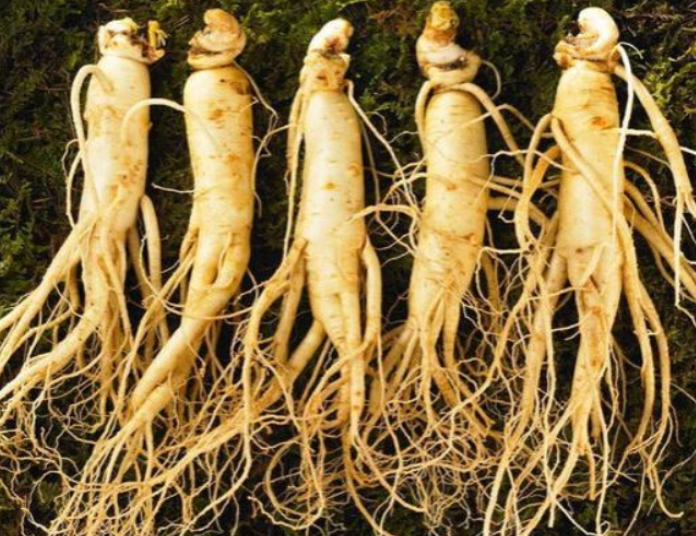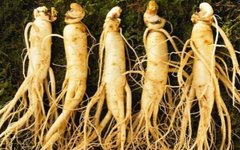Ginseng, known as the “King of Herbs,” comes in many varieties, with common types including Bai Shen (White Ginseng), Ye Shan Shen (Wild Mountain Ginseng), and Hong Shen (Red Ginseng). Ginseng has high medicinal value, possessing calming and qi-tonifying properties. Many people use ginseng to make infused water for its nourishing effects. However, not everyone can consume it; individuals with hypertension or those prone to insomnia should avoid ginseng.

What Types of Ginseng Are There?
Shen Xu (Ginseng Roots): Most commonly seen as Hong Shen Xu (Red Ginseng Roots), which have similar properties to Red Ginseng but are milder and less potent.
Sheng Shai Shen (Raw Sun-Dried Ginseng): This type is relatively mild, neither warming nor drying, and can tonify qi and generate fluids, suitable for strengthening the body and enhancing disease resistance.
Bai Shen (White Ginseng): Also known as Tang Shen (Sugar Ginseng), it is often made from shorter, lower-quality Korean ginseng, briefly boiled in hot water, soaked in sugar juice, and then dried. Its medicinal properties are the mildest, making it suitable for strengthening the spleen and benefiting the lungs.
Ye Shan Shen (Wild Mountain Ginseng): This type has no warming or drying properties and is excellent for tonifying original qi. However, it is rare and expensive, making it seldom used.
Hong Shen (Red Ginseng): This is steamed for two hours until fully cooked, dried, and then shaped into irregular cylindrical forms. Its medicinal properties are warming and tonifying, with a strong ability to invigorate yang qi, suitable for emergency resuscitation.
Organic Ginseng: Free from agricultural residues, chemical fertilizers, and genetically modified organisms, it retains the maximum amount of ginseng’s components and effects.
Benefits of Drinking Ginseng Infused Water
Greatly Tonifies Original Qi: Used for severe qi deficiency, characterized by weak breath, shortness of breath, cold limbs, sweating, and weak pulse. Ginseng alone can greatly tonify original qi and strengthen the heart, as seen in the formula Du Shen Tang (Ginseng Decoction). If qi deficiency is accompanied by yang collapse, it can be combined with Fu Zi (Aconite).
Regulates the Central Nervous System: Ginseng can regulate the central nervous system, improving the balance between excitation and inhibition in the brain; it enhances both mental and physical labor capacity, increases work efficiency, and has anti-fatigue effects.
Benefits Yin and Generates Fluids: Drinking ginseng-infused water can treat injuries to both yin and fluids, especially after heat illnesses with sweating.
Improves Cardiac Function: Ginseng can increase myocardial contractility, slow the heart rate, and enhance cardiac output and coronary blood flow, providing protection against myocardial ischemia and arrhythmias. Ginseng has a significant impact on heart function, cardiovascular health, and blood flow.
Tonifies the Lungs and Benefits Qi: Drinking ginseng-infused water can be used for insufficient lung qi, characterized by shortness of breath, wheezing, fatigue, and weakness.
Anti-Shock Effects: Ginseng can reduce allergic shock induced by guinea pig serum and prolong survival time. In burn shock mice, it can significantly delay death.
Blood Sugar Lowering Effects: Ginseng contains ginsenosides and ginseng polysaccharides. Notably, ginsenoside Rb2 has a significant blood sugar-lowering effect, while ginseng polysaccharides (or glycopeptides) are another class of blood sugar-lowering components in ginseng.
Effects on the Liver: Ginseng can increase the enzymatic activity of various substances in the liver, enhancing its detoxification capacity and improving the body’s tolerance to various chemicals.
Which Elderly Individuals Should Avoid Ginseng?
1. Elderly individuals prone to insomnia: Insomnia is caused by excessive excitation of the central nervous system, disrupting the body’s balance. Ginsenosides in ginseng can stimulate the central nervous system, disrupting the balance between excitation and inhibition in the cerebral cortex. Elderly individuals with insomnia who consume ginseng blindly may worsen their sleep quality.
2. Elderly individuals with high blood viscosity: Research has shown that ginseng contains a large amount of total ginsenosides, which can stimulate red blood cell growth. However, in patients with high blood viscosity, red blood cells may grow uncontrollably, increasing blood viscosity and affecting recovery.
3. Patients with gallstones or cholecystitis: Ginsenosides in ginseng act similarly to estrogen, inhibiting bile secretion and increasing bile viscosity. Long-term high-dose ginseng supplementation may increase the risk of gallstones. According to TCM, gallstones, cholecystitis, and acute hepatitis belong to the category of excess damp-heat, and self-administering ginseng can exacerbate damp-heat and worsen the condition.
4. Patients with arteriosclerosis and hypertension: Ginseng contains substances that inhibit fat breakdown, particularly arginine and aspartic acid, which can increase fat content in tissues and organs, accelerating the progression of atherosclerosis and potentially leading to cardiovascular accidents. Additionally, patients with hypertension may experience further increases in blood pressure and complications due to the accumulation of fat in the vascular walls.
Warm Reminder
It is important to note that ginseng is warming in nature and should not be used by individuals with oral ulcers, persistent heat in the palms and soles, or dry mouth and tongue. It should also be avoided during colds and fevers, as ginseng can accelerate blood circulation and exacerbate symptoms. Pregnant women, infants and children in growth phases, and young individuals should also refrain from self-administering ginseng.
Note:Some text and images in this article are sourced from the internet. The purpose of sharing this article is to convey more information. If there are any errors in source attribution or infringement of your legal rights, please notify us immediately, and we will promptly delete it and apologize.
Previous Reviews
-
The Effects and Functions of Astragalus: Precautions Before Consuming Astragalus Water
-
How to Consume Astragalus Effectively Without Causing Heat: This is How to Use Astragalus
-
What Are the Effects and Functions of Astragalus?
-
The Correct Way to Drink Buckwheat Tea: What Are the Effects, Functions, and Precautions of Buckwheat Tea?

